初中英语代词总结
初中英语代词总览
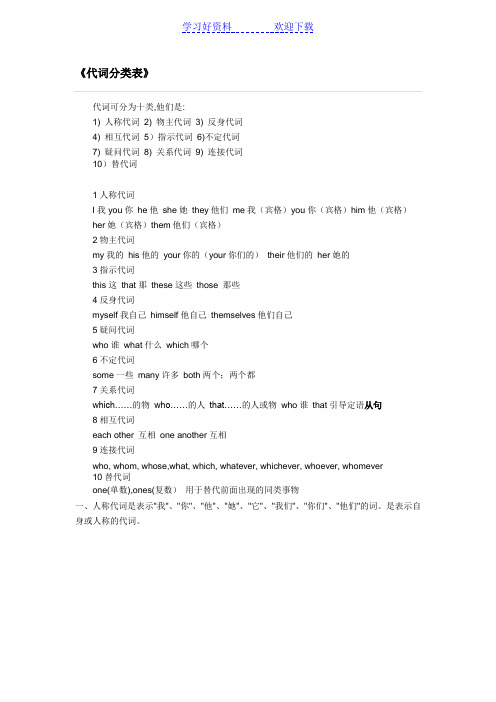
《代词分类表》代词可分为十类,他们是:1) 人称代词2) 物主代词3) 反身代词4) 相互代词5)指示代词6)不定代词7) 疑问代词8) 关系代词9) 连接代词10)替代词1人称代词I我 you你he他she她they他们me我(宾格)you你(宾格)him他(宾格)her她(宾格)them他们(宾格)2物主代词my我的his他的your你的(your你们的)their他们的her她的3指示代词this这that那these这些those 那些4反身代词myself我自己himself他自己themselves他们自己5疑问代词who谁what什么which哪个6不定代词some一些many许多both两个;两个都7关系代词which……的物who……的人that……的人或物who谁that引导定语从句8相互代词each other 互相one another互相9连接代词who, whom, whose,what, which, whatever, whichever, whoever, whomever10替代词one(单数),ones(复数)用于替代前面出现的同类事物一、人称代词是表示"我"、"你"、"他"、"她"、"它"、"我们"、"你们"、"他们"的词。
是表示自身或人称的代词。
人称代词有人称、数和格的变化,见下表:2) 物主代词:表示所有关系的代词叫做物主代词。
物主代词可分为形容词性物主代词和名词性物主代词两种。
列表如下。
形容词性物主代词可用作定语,例如:I love my country.我热爱我的国家。
Is this your car?这是你的汽车吗?名词性的物主代词可用作主语,宾语,表语以及与"of" 连接的定语。
初中英语语法总结-代词(共15张PPT)

功能 形容词性物 作主语 主代词 名词性物主 作主语 代词 作宾语 作表语 与of连用 作定语 例句 Her father is a doctor. This is her pen. Mine is broken. Her spoken English is better than mine. That pencil is hers. The blue coat of his is very beautiful. 备注 形容词性物主代词作定语 相当于形容词 名词性物主代词在句中不 能单独作定语。如: Yours English is better than hers Your English is better than hers.
none
指代人或物 可与of连用, 谓语动词用单复数均可 回答how many/much的提问
—Sorry, we’ve got none left.对不起,一张也没有了。
—Who is absent from classes today? 今天谁没有来上课? —No one, sir.没人缺席,先生。 —Tickets for Friday?星期五的票(还有吗)? None of them is/are in the classroom. 他们当中没有一个在教室里。
Tips: 1)排列顺序: 单数:二、三、一; You, he and I are all 复数:一、二、三; We, you and they are students. 2)第一人称单数代词I , 无论 在什么地方出现都要大写。
作形式主语、形式 宾语
指前文提到的物 指不知性别的婴儿 或不确定性别的人
词条 each every 每个(强调个体) 每个(整体描述) 用法 作主语、宾语、定语、同位语 两者或两者以上 只能作定语 三者或三者以上 可与of搭配 不可与of搭配
初中英语语法知识点整理总结-代词
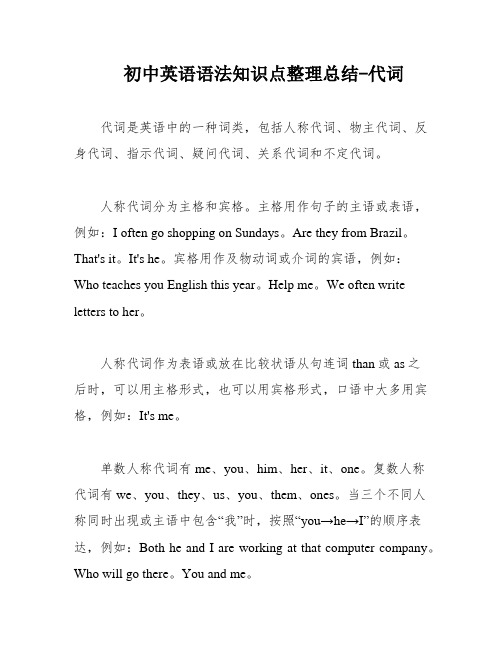
初中英语语法知识点整理总结-代词代词是英语中的一种词类,包括人称代词、物主代词、反身代词、指示代词、疑问代词、关系代词和不定代词。
人称代词分为主格和宾格。
主格用作句子的主语或表语,例如:I often go shopping on Sundays。
Are they from Brazil。
That's it。
It's he。
宾格用作及物动词或介词的宾语,例如:Who teaches you English this year。
Help me。
We often write letters to her。
人称代词作为表语或放在比较状语从句连词than或as之后时,可以用主格形式,也可以用宾格形式,口语中大多用宾格,例如:It's me。
单数人称代词有me、you、him、her、it、one。
复数人称代词有we、you、they、us、you、them、ones。
当三个不同人称同时出现或主语中包含“我”时,按照“you→he→I”的顺序表达,例如:Both he and I are working at that computer company。
Who will go there。
You and me。
人称代词it除了可以指人指物之外,还可以表示“时间、天气、温度、距离、情况”等含义,此外还可以作为“非人称代词”使用,替代作主语或宾语的不定式、动名词或名词性从句,例如:What's the weather like today。
It's fine。
What's the time。
It's 12:00.为反身代词的作用是强调动作的执行者与承受者是同一人或同一事物。
反身代词通常位于动词或介词后面。
如:I XXX XXX XXX(我在打篮球时弄伤了自己。
)He always talks to himself when he is alone。
(他独自一人时总是自言自语。
初中英语语法_代词
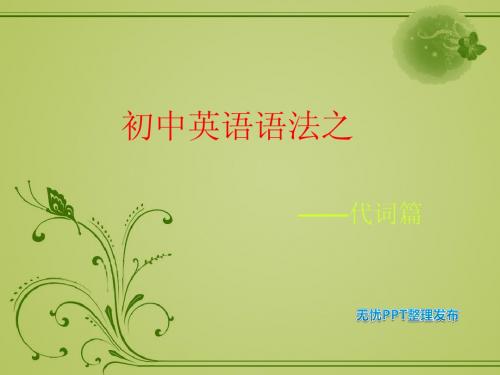
注意:
oneself 有单复数之分 * I enjoy myself. * Children, help yourselves to some fish.
1.The man is rich , he can buy ___ a lot of things . A. he B. his C. himself
It的用法:
1:it作为人称代词时,可以表示天气、
距离、时间、环境等
What’ the weather like today? – It’s windy.
今天的天气怎么样?- 有风。
It’s about five minutes’ walk from home to school.
从家到学校的路程大约5分钟。
3.another/other
another 泛指三个或三个以上中的另一
个
I don’t want this coat. Please show me another.
other 后面接名词,泛指别的、其他
的
Do you have any other questions?
4. the other/others/the others
4. ____ school is much bigger than ____.
A. Our , their
B. Ours , theirs
C. Our , theirs
5. The dog is so poor because ____ leg is badly hurt .
A. it B. its C. it’s
初中英语语法之
——代词篇
代词的分类
人称代词 物主代词 反身代词 不定代词 指示代词 疑问代词
英语语法总结-代词

初中英语语法大全:代词代词定义:代词是代替名词的一种词类。
大多数代词具有名词和形容词的功能。
考点直击】1. 人称代词主格、宾格形式及其主要用法;2. 名词性物主代词与形容词性物主代词的形式、区别及其主要用法;3 反身代词的形式、意义及其主要用法;4 常见不定代词的一般用法;5. 指示代词的一般用法,并了解其在上下文中的指代用法;6. 相互代词的基本用法;7. 疑问代词的基本用法。
8. 关系代词的基本用法。
I.人称代词表示“我”、“你”、“他”、“她”、“它”、“我们”、“你们”、“他们”的词,叫做人称代词。
人称代词有人称、数和格的变化,见下表:1.人称代词的一般用法:He is my friend.他是我的朋友。
It's me. 是我。
My dog likes him.我的狗喜欢他。
(1)作主语(用主格)I like table tennis. 我喜欢打乒乓球。
He is a student. 他是个学生。
(2)作表语(用主格,口语中常用宾格)Who is there?It's me(I). 是谁啊?是我。
(3)作宾语(用宾格)Do you know him?你认识他吗?Come with me. 跟我来。
注意I(我)无论放在句首、句中或句尾,都要大写。
2 特殊用法的人称代词It will rain tomorrow. 明天会下雨。
They speak English in the country. 在那个国家,人们说英语。
人称的习惯顺序:(1)如果有几个不同的人称同时作主语,且用and,or连接时,习惯顺序是:单数:you,he,and I复数:we,you,and they但是,如果是做错事,承担责任时,有时,说话的人把I(我)放在第一位。
----Who broke the Window?谁打碎了玻璃?---I and Li Ming. 我和李明.(2)we,you,they的特殊用法we,you,they有时并非指特定的人,译时不必译出“我们”、“你们”、“他们”。
初中英语代词知识点总结
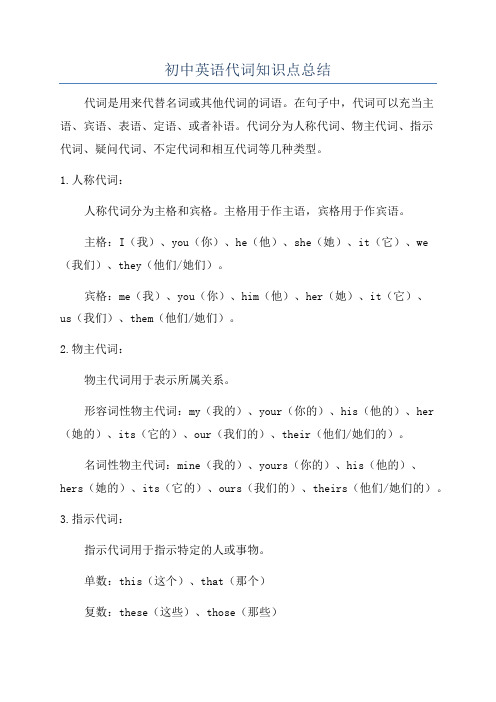
初中英语代词知识点总结代词是用来代替名词或其他代词的词语。
在句子中,代词可以充当主语、宾语、表语、定语、或者补语。
代词分为人称代词、物主代词、指示代词、疑问代词、不定代词和相互代词等几种类型。
1.人称代词:人称代词分为主格和宾格。
主格用于作主语,宾格用于作宾语。
主格:I(我)、you(你)、he(他)、she(她)、it(它)、we (我们)、they(他们/她们)。
宾格:me(我)、you(你)、him(他)、her(她)、it(它)、us(我们)、them(他们/她们)。
2.物主代词:物主代词用于表示所属关系。
形容词性物主代词:my(我的)、your(你的)、his(他的)、her (她的)、its(它的)、our(我们的)、their(他们/她们的)。
名词性物主代词:mine(我的)、yours(你的)、his(他的)、hers(她的)、its(它的)、ours(我们的)、theirs(他们/她们的)。
3.指示代词:指示代词用于指示特定的人或事物。
单数:this(这个)、that(那个)复数:these(这些)、those(那些)4.疑问代词:疑问代词用于引导疑问句。
主格:who(谁)、what(什么)宾格:whom(谁)5.不定代词:不定代词指代不特定的人或事物。
some(一些)、any(一些)、no(没有)、none(没有人/物)、something(事)、anybody(任何人)6.相互代词:相互代词指互相之间的关系。
each other(彼此)、one another(互相)在运用代词时,要注意代词的数(单数/复数)、格(主格/宾格)、性(男/女/中性)、以及与名词之间的一致性等规则。
通过多练习和阅读,可以更好地掌握代词的用法。
(完整)初中英语代词讲解

第三章 代词:代词的分类:英语中代词分为:人称代词、物主代词、反身代词、指示代词、关系代词、疑问代词、连接代词和不定代词等等。
第一节 人称代词、物主代词、反身代词1、人称代词:人称代词代替人和事物的名称,分为主格和宾格两种形式。
(1)、主格用来作句子的主语、表语。
如: I often go shopping on Sundays.(星期天我常去购物) /Are they from Brazil?(他们是巴西人吗?) / Where have they gone?(他们上哪儿去了?) / That ’s it.(就那么回事) / It ’s he!(是他!) (2)、宾格用来作及物动词或者介词的宾语。
如:Who teaches you English this year?(今年谁教你们的英语?) / Help me!(救救我!) / We often write letters to her.(我们常给他写信) (3)、人称代词作表语或者放在比较状语从句连词than 或as 之后时,可以用主格形式,也可以用宾格形式,口语中大多用宾格。
如:--Who is it?(是谁?) –It ’s I/me.(是我。
) (4)、三个不同人称同时出现,或者主语中包含“我”时,按照“you →he →I ”的顺序表达。
如: Both he and I are working at that computer company .(我和他都在那家电脑公司上班) –Who will go there ?(谁要去那儿?) –You and me .(你和我)(5)、人称代词it 除了可以指人指物之外,还可以表示“时间、天气、温度、距离、情况”等含义,此外还可以作“非人称代词”使用,替代作主语或者宾语的不定式、动名词或者名词性从句。
如:--What ’s the weather like today?(今天天气怎样?)—It ’s fine.(天气晴好) / --What ’s the time?(几点啦?) –It ’s 12:00.(12点) / It ’s a long way to go.(那可要走好长的路) / It took him three days to clean his house.(打扫屋子花了他三天的时间) / It is very clear that the public want to know when these men can go into space.(很显然,公众想知道这些人什么时候能进入太空) / We found it very difficult to learn a foreign language well .(我们发觉要学好一门外语是非常困难的)2、物主代词:说明事物所属关系的代词,分为形容词性和名词性两种。
初中英语知识点总结书代词
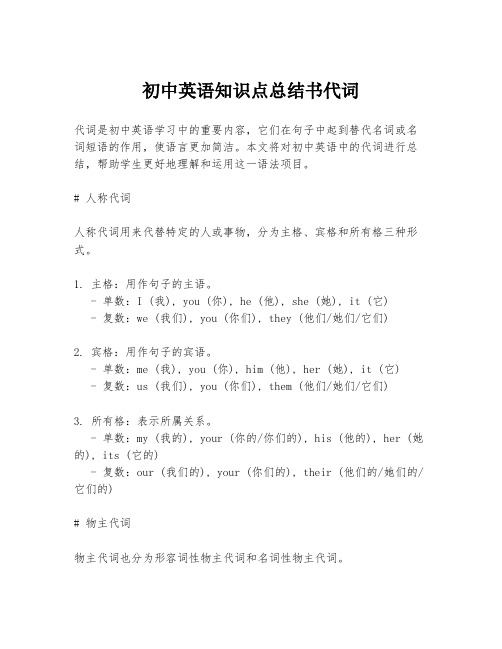
初中英语知识点总结书代词代词是初中英语学习中的重要内容,它们在句子中起到替代名词或名词短语的作用,使语言更加简洁。
本文将对初中英语中的代词进行总结,帮助学生更好地理解和运用这一语法项目。
# 人称代词人称代词用来代替特定的人或事物,分为主格、宾格和所有格三种形式。
1. 主格:用作句子的主语。
- 单数:I (我), you (你), he (他), she (她), it (它)- 复数:we (我们), you (你们), they (他们/她们/它们)2. 宾格:用作句子的宾语。
- 单数:me (我), you (你), him (他), her (她), it (它)- 复数:us (我们), you (你们), them (他们/她们/它们)3. 所有格:表示所属关系。
- 单数:my (我的), your (你的/你们的), his (他的), her (她的), its (它的)- 复数:our (我们的), your (你们的), their (他们的/她们的/它们的)# 物主代词物主代词也分为形容词性物主代词和名词性物主代词。
1. 形容词性物主代词:用来修饰名词,表示某物属于某人。
- 单数:my (我的), your (你的), his (他的), her (她的),its (它的)- 复数:our (我们的), your (你们的), their (他们的/她们的/它们的)2. 名词性物主代词:在句子中可以独立使用,通常用于回答问题或在没有后续名词的情况下。
- 单数:mine (我的), yours (你的), his (他的), hers (她的), its (它的)- 复数:ours (我们的), yours (你们的), theirs (他们的/她们的/它们的)# 反身代词反身代词用来指回句中的主语,表示动作反射到动作执行者自己身上。
- myself (我自己), yourself (你自己), himself (他自己), herself (她自己), itself (它自己)- ourselves (我们自己), yourselves (你们自己), themselves (他们/她们/它们自己)# 指示代词指示代词用来指示或标识人或物。
初中英语语法代词讲解
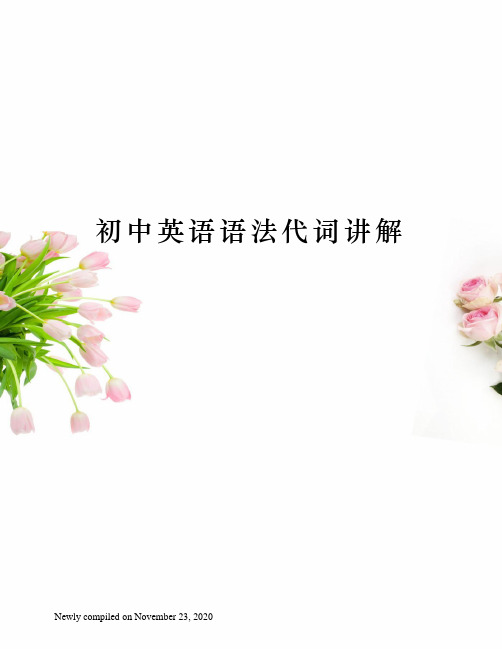
初中英语语法代词讲解Newly compiled on November 23, 2020初中英语语法代词代词:为了避免重复而用来代替其他词的词。
种类:1) 人称 2) 物主 3) 反身4) 指示 5)不定6) 疑问7) 相互代词:each other, one another互相,其所有格加-’s8) 关系代词:which, who,that,whom,whose等引导定语从句9) 连接代词:who, whom, whose, what, which, whatever, whichever, whoever, whomever10)替代词:one(单数), ones(复数)用于替代前面出现的同类事物。
但ones必须和形容词连用。
如果替代的名词时无形容词在前,则用some, any,而不用ones。
如:Have you bought any rulers Yes,I 've bought some.一、人称代词1.人称代词的形式2.人称代词的句法功能3.人称代词的排列顺序(单数231,复数123)当两个以上的人称代词一起作主语时,单数按二、三、一人称排列(即you, he / she, I);复数按一、二、三人称排列(即we, you, they)。
但是如果做错了事需要承担责任时,要把说话人(I)放在第一位。
如:It was I and John that made her angry. 是我和约翰惹她生气了。
二、物主代词1.物主代词的形式2.物主代词的基本用法3.物主代词的特殊用法在双重所有格中只能用名词性物主代词。
如:我的一个朋友a friend of mine ,她的一个同学 a classmate of hers , each brother of his.三、反身代词1.反身代词的形式反身代词又叫自身代词,表示动作返回到动作发出者本身。
2.反身代词的句法功能3.由反身代词构成的习惯用语①help oneself to 随便吃……②come to oneself 苏醒过来,醒悟,恢复知觉③dress oneself 自己穿衣服④say to oneself 自言自语⑤enjoy oneself 玩得开心⑥lose oneself in迷路于,全神贯注于…之中,消失于⑦teach oneself 自学⑧look after oneself ⑨by oneself 亲自learn……by oneself 自学…leave one by oneself 把某人单独留下hurt oneself 伤了自己make yourself/yourselves at home 不必拘束四、指示代词1. that 用来代替前面提到的不可数名词,those代替复数名词。
初中英语代词
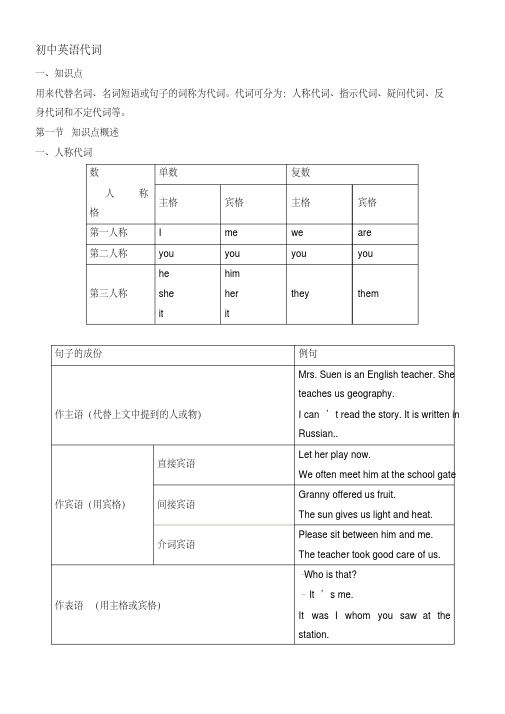
初中英语代词一、知识点用来代替名词、名词短语或句子的词称为代词。
代词可分为:人称代词、指示代词、疑问代词、反身代词和不定代词等。
第一节知识点概述一、人称代词数人称格单数复数主格宾格主格宾格第一人称I me we are 第二人称you you you you第三人称hesheithimheritthey them句子的成份例句作主语(代替上文中提到的人或物)Mrs. Suen is an English teacher. She teaches us geography.I can’t read the story. It is written in Russian..作宾语(用宾格)直接宾语Let her play now.We often meet him at the school gate 间接宾语Granny offered us fruit.The sun gives us light and heat.介词宾语Please sit between him and me.The teacher took good care of us.作表语(用主格或宾格)–Who is that?–It’s me.It was I whom you saw at the station.1.人称代词不仅仅指人,也可以指事或物。
2.人称代词主格单数he, she和it的复数,都是they,宾格形式也相同,为them。
3.第三人称的人称代词分阳性he(him),阴性she(her)和中性it(it),复数只有一个形式they (them),不分性别。
4.选用什么人称代词,取决于所要代替的名词。
在数和性上要与所代替的名词保持一致。
二、物主代词物主代词是用来表示所有关系的,分为形容词性物主代词和名词性物主代词两种。
形容词性物主代词放在名词前作定语,相当于形容词;名词性物主代词相当于―形容词性物主代词+名词‖,相当于名词,可以作主语、表语或宾语。
初中英语语法:代词(共92张)
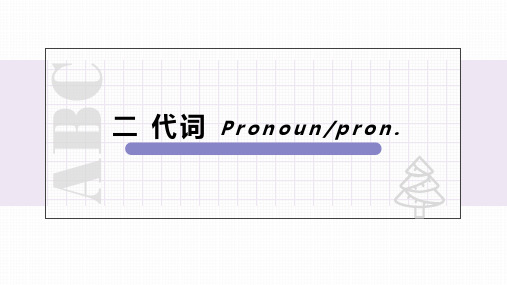
last night?
7 不定代词
7.1 some/any/few/little 7.2 both/neither/either/all/none 7.3 each/every 7.4 one/ones 7.5 another/the other/others/the others 7.6 a number of/a great deal of
LOGO
我可爱的妹妹们有一辆新的自行车
My lovely sisiters has a new bicycle.
【误】Lovely my…… have
注意② 形容词性物主代词与形容词一起修饰名词时 其顺序是:形容词性物主代词+形容词+名词 注意③ 形容词性物主代词所修饰的名词可以是单数, 也可以是复数。
7.7 复合不定代词
人称代词
LOGO
第一人称:自称“吾”“我”“余”“予”“朕”“孤”“寡人” 第二人称:对称“尔”“汝”“女”“若”“乃”“而” 第三人称:他称“彼”“其”“之”
我/你/他/她/它 我们/你们/他们/她们/它们
LOGO
LOGO
LOGO
主格:作主语,表示谁怎么样了、干什么了。
7.1 some/any/few/little LOGO
many修饰【C】much【U】
Peter has_______friends. Peter has_______food for his birthday party.
how many修饰【C】how much【U】
______________tea is there in the cup? ______________pieces of bread are there on the
初中英语代词
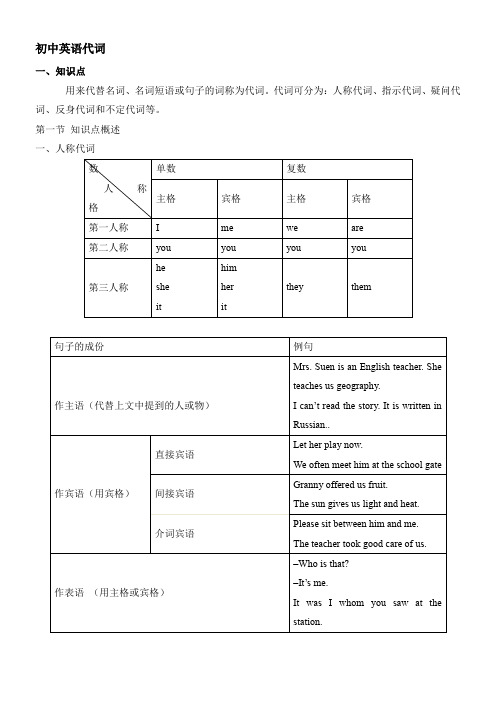
初中英语代词一、知识点用来代替名词、名词短语或句子的词称为代词。
代词可分为:人称代词、指示代词、疑问代词、反身代词和不定代词等。
第一节知识点概述一、人称代词1.人称代词不仅仅指人,也可以指事或物。
2.人称代词主格单数he, she和it的复数,都是they,宾格形式也相同,为them。
3.第三人称的人称代词分阳性he(him),阴性she(her)和中性it(it),复数只有一个形式they (them),不分性别。
4.选用什么人称代词,取决于所要代替的名词。
在数和性上要与所代替的名词保持一致。
二、物主代词物主代词是用来表示所有关系的,分为形容词性物主代词和名词性物主代词两种。
形容词性物主代词放在名词前作定语,相当于形容词;名词性物主代词相当于―形容词性物主代词+名词‖,相当于名词,可以作主语、表语或宾语。
物主代词的用法:(1)形容词性物主代词放在名词前作定语。
例如:His pencil box is on the desk.This is our school.本身就相当于―形容词性物主代词+名词‖,因此,后面不可再加名词。
作主语:Richard’s school bag is blue and mine is black. 里查德的书包是蓝色的,我的书包是黑色的。
(mine=my school bag)作表语:It’s his. 这是他的(东西)。
作宾语:He borrows your dictionary and you may borrow mine. 他借你的字典,你可以借我的。
(作及物动词的宾语)―of+名词性物主代词‖可以放在名词后作定语,表示强调:He is a friend of mine. 他是我的一个朋友。
·注意:试比较下面两句句子:This is a photo of mine. 这是我的一张照片。
(照片是我拥有的,但不一定照的是我本人)This is a photo of me. 这是一张我本人的照片。
初中英语语法大全 之 代词部分
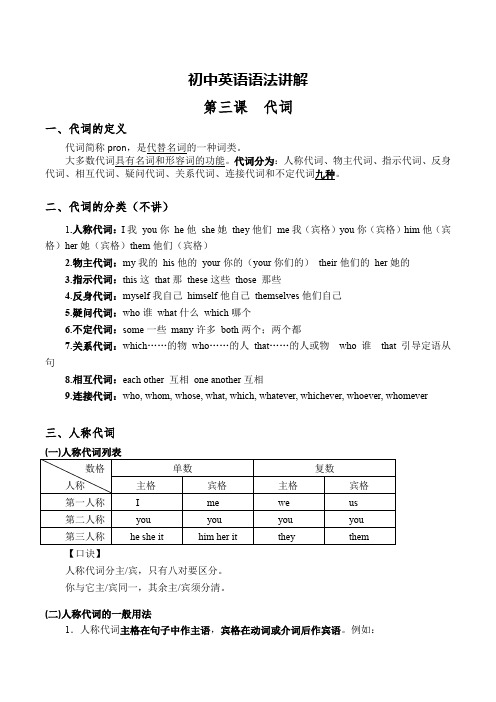
初中英语语法讲解第三课代词一、代词的定义代词简称pron,是代替名词的一种词类。
大多数代词具有名词和形容词的功能。
代词分为:人称代词、物主代词、指示代词、反身代词、相互代词、疑问代词、关系代词、连接代词和不定代词九种。
二、代词的分类(不讲)1.人称代词:I我you你he他she她they他们me我(宾格)you你(宾格)him他(宾格)her她(宾格)them他们(宾格)2.物主代词:my我的his他的your你的(your你们的)their他们的her她的3.指示代词:this这that那these这些those 那些4.反身代词:myself我自己himself他自己themselves他们自己5.疑问代词:who谁what什么which哪个6.不定代词:some一些many许多both两个;两个都7.关系代词:which……的物who……的人that……的人或物who谁that引导定语从句8.相互代词:each other 互相one another互相9.连接代词:who, whom, whose, what, which, whatever, whichever, whoever, whomever三、人称代词【口诀】人称代词分主/宾,只有八对要区分。
你与它主/宾同一,其余主/宾须分清。
(二)人称代词的一般用法1.人称代词主格在句子中作主语,宾格在动词或介词后作宾语。
例如:I like table tennis.(I作主语)Do you know him?(him作宾语)2.(不讲)人称代词还可以作表语。
作表语时用宾格。
例如:—Who is knocking at the door?—It's me.注意:I(我)无论放在句首、句尾还是句中,都要大写。
(三)人称代词的特殊用法【口诀】人称代词主宾格,作用不同莫用错。
主格动前做主语,动词介词后宾格。
单数人称二三一,复数人称一二三(顺序)。
初中英语代词

A sister of his is a nurse.
他的一个妹妹是个护士。
Tom is a friend of mine
我的一个朋友
1. She is a friend of ________. A. my B. mine C. I 2. This isn’t my pen ,it is _____. A. her B. his C. him 3. Frank can’t find ____ dictionary . Can you lend ____ to _____? A. her , mine , her B. / , yours , he C. his , yours , him
8.both/either/neither(P51-53) both ―(两者)都”,作主语时看作复数;
作定语时后跟名词复数
My parents are both teachers.
neither ―(两者)都不”,含有否定意义,
作主语时谓语用第三人称单数; 作定语时后跟 名词单数
Neither answer is right.
1.The man is rich , he can buy ___ a lot of things . A. he B. his C. himself
2. --- What a lovely card ! Where did you buy it? --- I made it by _____.
A. me B. myself C. itself 3. ―Help ____ to some chicken ,‖my mother said to the guests. A. yourself B. yourselves C. your
初中英语语法知识点整理总结-代词
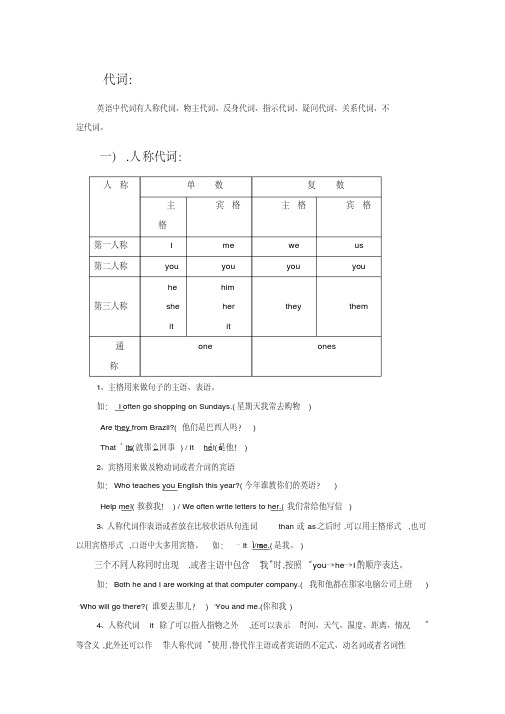
代词:英语中代词有人称代词、物主代词、反身代词、指示代词、疑问代词、关系代词、不定代词。
一).人称代词:人称单数复数主格宾格主格宾格第一人称I me we us第二人称you you you you第三人称hesheithimheritthey them通称one ones1、主格用来做句子的主语、表语。
如:I often go shopping on Sundays.(星期天我常去购物)Are they from Brazil?(他们是巴西人吗?)That’sit.(就那么回事) / It’she!(是他!)2、宾格用来做及物动词或者介词的宾语如:Who teaches you English this year?(今年谁教你们的英语?)Help me!(救救我!) / We often write letters to her.(我们常给他写信)3、人称代词作表语或者放在比较状语从句连词than或as之后时,可以用主格形式,也可以用宾格形式,口语中大多用宾格。
如:–It’sI/me.(是我。
)三个不同人称同时出现,或者主语中包含“我”时,按照“you→he→I”的顺序表达。
如:Both he and I are working at that computer company.(我和他都在那家电脑公司上班) –Who will go there?(谁要去那儿?) –You and me.(你和我)4、人称代词it除了可以指人指物之外,还可以表示“时间、天气、温度、距离、情况”等含义,此外还可以作“非人称代词”使用,替代作主语或者宾语的不定式、动名词或者名词性从句。
fine.(天气晴好) / 如:--What’s the weather like today?(今天天气怎样?)—It’s:00.(12点)--What’s the time?(几点啦?) –It’s 12a long way to go.(那可要走好长的路) / It took him three days to clean his house.It’sIt is very clear that the public want to know when these men can go into space.(很显然,公众想知道这些人什么时候能进入太空)We found it very difficult to learn a foreign language well.(我们发觉要学好一门外语是非常困难的)二).物主代词:人称单数复数名词性形容词性名词性形容词性第一人称my mine our ours第二人称your yours your yours第三人称his her its his hers its their theirs通称one's1、形容词性物主代词只能作句子中名词的修饰语,后面要跟名词。
初中英语语法大全:代词
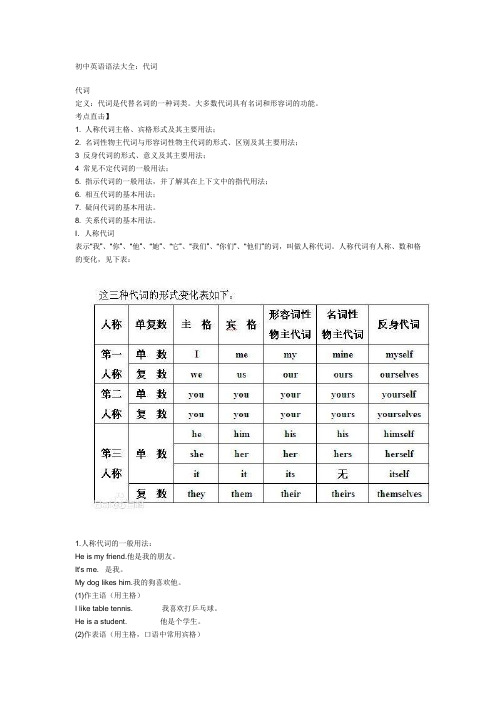
初中英语语法大全:代词代词定义:代词是代替名词的一种词类。
大多数代词具有名词和形容词的功能。
考点直击】1. 人称代词主格、宾格形式及其主要用法;2. 名词性物主代词与形容词性物主代词的形式、区别及其主要用法;3 反身代词的形式、意义及其主要用法;4 常见不定代词的一般用法;5. 指示代词的一般用法,并了解其在上下文中的指代用法;6. 相互代词的基本用法;7. 疑问代词的基本用法。
8. 关系代词的基本用法。
I.人称代词表示“我”、“你”、“他”、“她”、“它”、“我们”、“你们”、“他们”的词,叫做人称代词。
人称代词有人称、数和格的变化,见下表:1.人称代词的一般用法:He is my friend.他是我的朋友。
It's me. 是我。
My dog likes him.我的狗喜欢他。
(1)作主语(用主格)I like table tennis. 我喜欢打乒乓球。
He is a student. 他是个学生。
(2)作表语(用主格,口语中常用宾格)Who is there?It's me(I). 是谁啊?是我。
(3)作宾语(用宾格)Do you know him?你认识他吗?Come with me. 跟我来。
注意I(我)无论放在句首、句中或句尾,都要大写。
2 特殊用法的人称代词It will rain tomorrow. 明天会下雨。
They speak English in the country. 在那个国家,人们说英语。
人称的习惯顺序:(1)如果有几个不同的人称同时作主语,且用and,or连接时,习惯顺序是:单数:you,he,and I复数:we,you,and they但是,如果是做错事,承担责任时,有时,说话的人把I(我)放在第一位。
----Who broke the Window?谁打碎了玻璃?---I and Li Ming. 我和李明.(2)we,you,they的特殊用法we,you,they有时并非指特定的人,译时不必译出“我们”、“你们”、“他们”。
初中英语语法大全汇总[3]代词
![初中英语语法大全汇总[3]代词](https://img.taocdn.com/s3/m/038c5310581b6bd97f19ea85.png)
初中英语语法大全汇总(三)代词(Pronouns)一、代词的分类:英语中代词分为:人称代词、物主代词、反身代词、指示代词、关系代词、疑问代词、连接代词和不定代词等等。
1 I often go shopping on Sundays.(我常去购物) / Are they from Brazil?(他们是巴西人吗?) / Where have theygone?(他们上哪儿去了?) / That’s it.(就那么回事) / It’s he!(是他!)2、宾格用来作及物动词或者介词的宾语。
如:Who teaches you English thisyear?(今年谁教你们的英语?) / Help me!(救救我!) / We often writeletters to her.(我们常给他写信)3、人称代词作表语或者放在比较状语从句连词than或as之后时,可以用主格形式,也可以用宾格形式,口语中大多用宾格。
如:--Who is it?(是谁?) –It’sI/me.(是我。
)4、三个不同人称同时出现,或者主语中包含“我”时,按照“you→he→I”的顺序表达。
如:Both he and I are working at that computer company.(我和他都在那家电脑公司上班) –Who will go there?(谁要去那儿?) –You and me.(你和我) 人称代词it除了可以指人指物之外,还可以表示“时间、天气、温度、距离、情况”等含义,此外还可以作“非人称代词”使用,替代作主语或者宾语的不定式、动名词或者名词性从句。
如:--What’s the weather like today?(今天天气怎样?)—It’s fine.(天气晴好) / --What’s the time?(几点啦?) –It’s 12:00.(12点) / It’s a long way to go.(那可要走好长的路) / It took him three days to clean his house.(打扫屋子花了他三天的时间) / It is very clear that the public want to know whenthese men can go into space.(很显然,公众想知道这些人什么时候能进入太空) / We found it very difficult to learn a foreign language well.(我们发觉要学好一门外语是非常困难的) 代词it 的用法:①指代前面提到过的事物。
初中英语语法知识梳理——代词
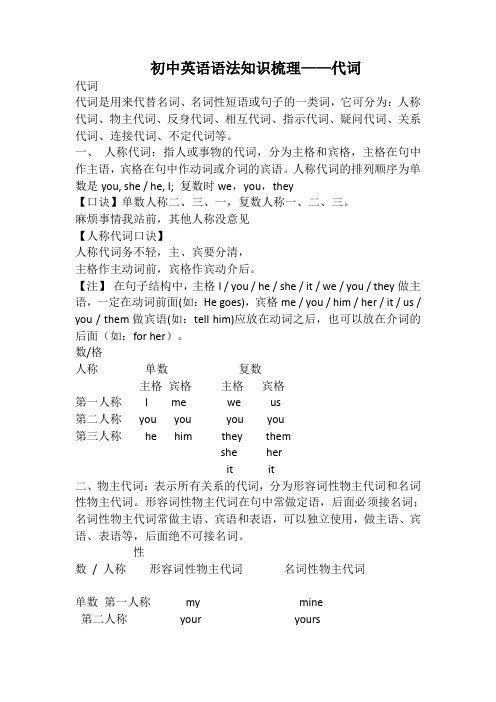
初中英语语法知识梳理——代词代词代词是用来代替名词、名词性短语或句子的一类词,它可分为:人称代词、物主代词、反身代词、相互代词、指示代词、疑问代词、关系代词、连接代词、不定代词等。
一、人称代词:指人或事物的代词,分为主格和宾格,主格在句中作主语,宾格在句中作动词或介词的宾语。
人称代词的排列顺序为单数是you, she / he, I; 复数时we,you,they【口诀】单数人称二、三、一,复数人称一、二、三。
麻烦事情我站前,其他人称没意见【人称代词口诀】人称代词务不轻,主、宾要分清,主格作主动词前,宾格作宾动介后。
【注】在句子结构中,主格I / you / he / she / it / we / you / they做主语,一定在动词前面(如:He goes),宾格me / you / him / her / it / us / you / them做宾语(如:tell him)应放在动词之后,也可以放在介词的后面(如:for her)。
数/格人称单数复数主格宾格主格宾格第一人称I me we us第二人称you you you you第三人称he him they themshe herit it二、物主代词:表示所有关系的代词,分为形容词性物主代词和名词性物主代词。
形容词性物主代词在句中常做定语,后面必须接名词;名词性物主代词常做主语、宾语和表语,可以独立使用,做主语、宾语、表语等,后面绝不可接名词。
性数/ 人称形容词性物主代词名词性物主代词单数第一人称my mine第二人称your yours第三人称his hisher hersits its复数第一人称our ours第二人称your yours第三人称their theirs【物主代词用法口诀】物主代词两类型,形容词与名词性。
形容词性作定语,后面定把名词用。
名词性要独立用,主宾表语它都充。
【速记口诀】物主代词分形、名,形式用法各不同;形容词性先出场:我的my你的your;男的his女的her,它的its不加撇;我们的our他们的their,别忘记!物主代词形变名,多数词尾加“s”;my变mine须分明,his和its 是本身;形跟名词,名不跟,用法牢记不会错!【注】“形跟名词,名不跟。
初中英语语法代词总结

1. 人称代词人称代词是表示“我”、“你”、“他”、“我们”、“你们”、“他们”等的词,有人称、数和格的变化。
单数复数主格宾格主格宾格第一人称I me we us第二人称you you you you第三人称he, she,ithim,her, itthey them人称代词的用法:(1)作主语(用主格)We all like maths very much. 我们都很喜欢数学。
(2)作宾语(用宾格)Would you mind giving her a hand? 你能帮帮她吗?I’m very pleased with it. 我对它很满意。
(3)作表语(非常正式用主格,常用宾格) Open the door, please. It’s me. 请打开门,是我。
注意:两个或者两个以上的人称代词并列的时候,单数形式排列一般是:第二人称在前面,第三人称在中间,第一人称在后面。
例如:You, he and I are all your father’s students. 复数形式的排列一般是:第一人称在前面,第二人称在中间,第三人称在后面。
例如:We, you and they all go swimming after school. 如果表示承担错误和责任,一般把I最前面。
2. 物主代词物主代词表示所有关系,它可以分为形容词性物主代词和名词性物主代词两种形式。
名词性物主代词可以在句子中作主语、表语和宾语,相当于形容词性物主代词+名词。
例如:This isn’t my coat. Mine (=my coat) has been put in the classroom.这不是我的大衣,我的(大衣)已经放在教室里了。
A student of his (= his students) has gone to America. 他的一个学生去美国了。
形容词性物主代词在句子中作定语,后面接名词。
例如:This is my book. 这是我的书。
- 1、下载文档前请自行甄别文档内容的完整性,平台不提供额外的编辑、内容补充、找答案等附加服务。
- 2、"仅部分预览"的文档,不可在线预览部分如存在完整性等问题,可反馈申请退款(可完整预览的文档不适用该条件!)。
- 3、如文档侵犯您的权益,请联系客服反馈,我们会尽快为您处理(人工客服工作时间:9:00-18:30)。
用法:1人称代词主格作主语。
当几个不同的人称代词时,排列顺序是:单数是二、三、一。
复数是一、二、三。
2人称代词宾格作宾语。
主要用在动词和介词后。
3形容词性物主代词相当于一个形容词,后必需加名词。
4名词性物主代词相当于一个名词,后不用加名词。
(形容词性物主代词+名词=名词性物主代词。
5反身代词主要用一些固定词组中:teach oneself; learn by oneself; enjoy oneself; help oneself(to +sth.);hurt oneself; by oneself; see ……oneself; say oneself;dress oneself
指示代词用法that(1)的用法和中文的用法是不同的。
He was ill. That’s why he didn’t come. that those可以代替前面提到过的事物.eg: The weather of Kunming is better than that (=the weather)of Beijing. The radios made in Shanghai are as good as those (the radios) made in Tianjin.
it one that 的区别:
it用来指特指,指上下文提到同一对象,同一事物。
eg: May I use your bike? Sure ,you can use it.(=the bike.)
one 泛指,指上文提到的同类事物中一个,同类而不同一。
Who has a pen? I have one .(a pen) that 代替前面提到的名词,以避免重复。
The weather in Beijing is colder than that(the weather)in Guangzhou.
1. some, any ,no,和every可以和one, body, thing构成复合代词,它们的用法与some any的用法相同some用在肯定句和期待得到对方的肯定的回答的疑问中。
any用于疑问句、否定句和条件中。
2 修饰不定代词的词一定要放在不定代词后。
I have something important to tell you.
3. 当主句的主语是人的复合不定代词如eveybody ,nobody ,anyone等时,其反意疑问句的主语通常用代词they;当主句中的主语是指物复合不定代词如everything, anyting, something nothing等时,其反意疑问句的主语用代词it. Everyting is ready, isn’t it? Everyone is here, aren’t they?
4.复合不定代词本身做主语时谓语用单数。
5.everybody=everyone,只能指人;every one既可指人又可指物,还可以和of连用。
1.both两者都;all三者或三者以上人或物都。
在句中作主语时,谓语用复数。
与not连用时,表示部分否定,译为“并非所有都……Both John and Ann have friends.All of us don’t like meat.=Not all of us like meat.
2.either用于两者,指两者之一(两者间任何一个);any用于三者或三者以上。
When shall we meet,this evening or tomorrow morning. Either time is OK. when shall we meet? Any time is OK.
3.neither是both的反义词,表示“两者都不”。
作主语时谓语用单数。
none是all的反义词,表示“三者或三者以上的人或物都不。
”作主语时可单可复。
注意none与no one的区别。
There is a little water in the bottle, is there?
There is little water in the bottle, isn’t there?
2.I don’t like the book, please give me another one..
3.Some students are listening to the radio, others (=other students) are watching TV.(可能还有一些人在干别的。
)
4.There are thirty students in our class. Twenty are girls, the other students(=the others) are boys.
5. There are thirty students in our class. Twenty are from Beijing. The others are from Nanjing.(其余的全来自南京)
6. There are thirty students in our class. Twenty are from Beijing. others are from Nanjing.(还有来自南京的,暗示其余十人不只是来自南京,还可能有来自上海等地。
)
7.You can stay another ten days.=You can stay ten more days.。
